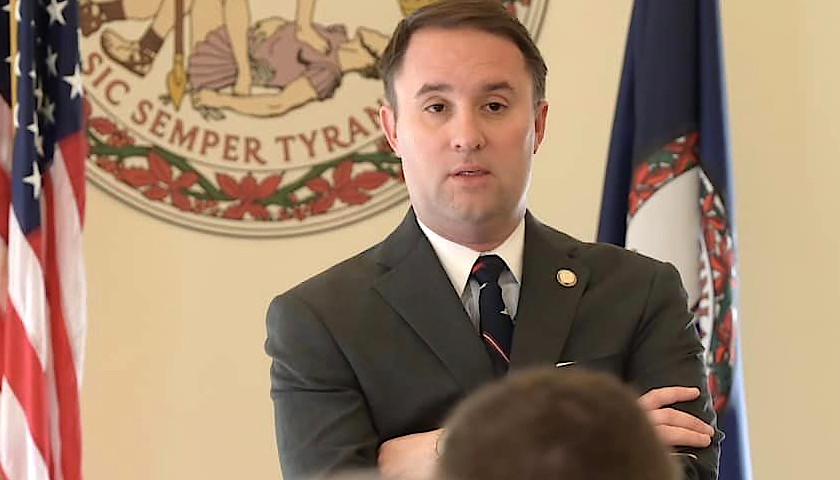U.S. Congressman Mike Gallagher (R-WI-8) this week touted an emerging effort in both houses of Congress to ban the video-sharing application TikTok nationwide.
Gallagher and U.S. Senator Marco Rubio (R-FL) penned an opinion piece for The Washington Post last month insisting Americans should not have access to the app. In a discussion with WISN CHANNEL 12 on Monday, Gallagher said he will introduce bipartisan legislation to that effect this month and he anticipates it will get a vote early next year.
Leaked recordings of business meetings revealed earlier this year that employees of TikTok’s Beijing-based parent company ByteDance have acquired copious data from U.S. users. While the Biden administration is negotiating with TikTok to ensure the discontinuation of such information mining, some lawmakers doubt any measure short of a ban would satisfy security concerns.
“There’s a lot of Republican support; we’re slowly bringing our Democratic colleagues along,” he said. “I think the more that people learn about the company that controls TikTok, the more concerns they have. And ultimately who controls that company is the Chinese Communist Party [CCP] and that’s not someone we should trust with our data.”
Gallagher, a member of the House Permanent Select Committee on Intelligence, joined Wisconsin Republican Senator Ron Johnson and fellow GOP House colleagues from Wisconsin in urging Governor Tony Evers (D) to bar any state use of TikTok. While Utah, Texas, South Dakota, Maryland, Nebraska, Tennessee and South Carolina all recently adopted that policy, Evers has not committed to doing the same.
Robert E. Wright, a senior faculty fellow at the American Institute for Economic Research, stated he believes state governments can justifiably ban the program from their devices. He nonetheless voiced skepticism that the Constitution permits the federal government to stop all citizens from acquiring a communication-software product and suggested public officials would need to make a hefty case that national security demands such action.
“Obviously, any attempt by government to ban private individuals from downloading TikTok onto their own private devices would be highly problematic on First Amendment grounds,” he told The Wisconsin Daily Star.
Wright also encouraged those who want to rid America of TikTok — and of other commercial ties to China — to be objective amidst domestic pressures.
“Social media companies would love to win back eyeballs from TikTok, for example, and it is really unclear at this point if the views of anyone, in the government, the media, or industry, can be trusted,” he explained.
American Enterprise Institute senior fellow Derek Scissors also told The Daily Star he would prefer a more measured response to an outright ban.
“TikTok gathers huge amounts of data on users and must answer to the Chinese Communist Party – a terrible combination,” he wrote in an email. “But an airtight agreement to keep user data under US control would address the main concerns and make a ban unnecessary.”
Other free-marketers see a ban as potentially wise from a national-security perspective. Jessica Melugin, who directs the Center for Technology & Innovation at the Competitive Enterprise Institute, said the right decision may ultimately depend on classified information that only federal policymakers are permitted to examine.
“I think it’s certainly reasonable to be concerned,” she said. “The policy of the Chinese government is that they are able to look at — without any objection — anything they want from the companies that are domiciled there. That is a country that we don’t have great relations with, so I think probably there are some legitimate concerns but it’s a difficult issue because what exactly those concerns are is hard to chronicle.”
Melugin said clear problems with China’s conduct include not only data mining and invasive tracking of Americans but also algorithm manipulation designed to effectively censor opponents of the CCP.
She added that while growing numbers of public officials are coalescing against TikTok, many users may demur. Still, she said, national security should be the paramount concern.
“That demographic is young,” she said. “It’s one of the more apolitical platforms; TikTok does a good job of staying out of all the trouble that the other ones get themselves into because it’s fun stuff — it’s dances and humor and all this great stuff, so I think it’ll be a hard sell for some voters that this is really problematic. But again, if [policymakers] know something in detail that they don’t feel like it’s a good idea to tell us, then that really changes things.”
– – –
Bradley Vasoli is managing editor of The Wisconsin Daily Star. Follow Brad on Twitter at @BVasoli. Email tips to [email protected].
Photo “Mike Gallagher” by Congressman Mike Gallagher. Background Photo “TikTok” by Solen Feyissa. CC BY-SA 2.0.





